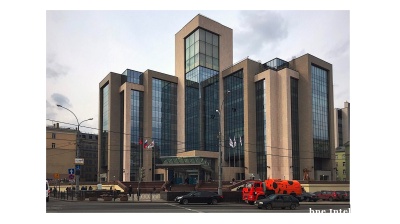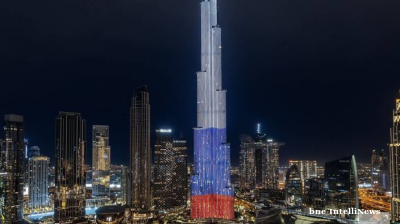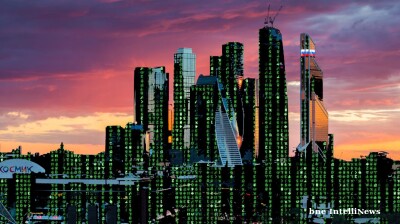As once more the fears of an “imminent invasion”spike from a White House briefing, the mood in the eastern city of Kharkiv remains one of calm, cynicism and disillusion on February 11.
War fears soared the same day after US National Security advisor Jake Sullivan gave a press briefing where he claimed that Russia now has enough forces on Ukraine’s border for an invasion and such an assault could seize large swaths of the country, including the capital Kyiv.
A Russian invasion of Ukraine could begin "any day now," Sullivan said, adding Moscow is in position to mount a "major military action,” but that it was not known if a final decision to go in had been made.
The markets instantly reacted with the ruble losing two rubles against the dollar to fall to RUB77.2 from around RUB75 earlier in the day. The leading RTS index also dropped from 1,550 to 1,480 on the news, giving up most of its gains from the easing of geopolitical tension in the last two weeks. Oil prices also spiked, rising to $95 per barrel on the news.
Sullivan, speaking at a White House briefing, without providing specific evidence for the given outlook, said any American still in Ukraine should leave in the next 24-48 hours.
“We want to be crystal clear on this point: Any American in Ukraine should leave as soon as possible and, in any event, in the next 24 to 48 hours,” Sullivan said, adding: “If you stay, you are assuming risk with no guarantee that there will be any other opportunity to leave and no prospect of a US military evacuation in the event of a Russian invasion.”
Several other embassies advised their citizens to go home while they can including those of Japan, Israel and the UK. Other European embassies including the German and French, are working normally and have not advised their nationals to leave.
Sullivan painted a terrifying hypothetical scenario where a Russian invasion could start with an air assault that would kill civilians and make departures difficult. However, he was at pains to emphasize that the US was not predicting an imminent invasion, but only saying all the pieces were in place according to “new intelligence” and that an invasion could happen any time now.
“As we’ve said before, we are in the window when an invasion could begin at any time, should Vladimir Putin decide to order it,” Sullivan said at the news briefing. “I will not comment on the details of our intelligence information, but I do want to be clear: It could begin during the Olympics, despite a lot of speculation that it would only happen after the Olympics.”
“We are not saying that a decision has been taken — a final decision — has been taken by President Putin,” Sullivan said. “What we are saying is that we have a sufficient level of concern based on what we are seeing on the ground and what our intelligence analysts have picked up.”
It has been widely assumed until now that any attack by Russia would be put off until after the Olympics finish on February 20 so as not to embarrass Russia’s partners in Beijing.
Sullivan spoke after President Joe Biden held a secure video call with transatlantic leaders from the UK, France, Germany, Italy, Poland and Romania and sought allied unity in the face of a worsening situation.
Biden was also due to speak to both Putin and French President Emmanuel Macron over the weekend on February 13. German Chancellor Olaf Scholz will continue the diplomatic effort at the start of the coming week with a trip to Kyiv on February 14 followed the next day with a trip to Moscow to meet with Putin.
All calm on the eastern front
Located right on the border with Russia and Ukraine’s second largest city, Kharkiv remains a major industrial and educational centre, boasting factories and many universities. If a war starts it could be among the first Ukrainian cities to be occupied by an invading Russian army.
Talk of war is omnipresent in Kharkiv, as it has been since the major industrial hub narrowly avoided the same fate as Donetsk and Luhansk in 2014, 300km away to the south. An attempt to create a “Kharkiv People’s Republic” failed as the city remained resolutely Ukrainian.
Nonetheless, the “imminent” arrival of Russian mechanised brigades takes a back seat in most people’s conversations to economic problems. People in Kharkiv, especially the young and the educated, look west to Kyiv and Poland, and to a lesser extent a few still look eastwards to Moscow, lured by the pull of higher salaries rather than the pressure of nearby Russian armour and mortars.
While Kharkiv remains a major industrial centre for Ukraine, the area has never really recovered from the collapse of the Soviet Union, with the war in 2014 and subsequent abrupt cutting off of trade with Russia also hitting the city hard.
Workers in Kharkiv’s biscuit factory don't sugar-coat the problems. Salaries in Poland for factory work are up to four times higher and many workers in Kharkiv, such as Anton, would be happy to move westwards for higher salaries for similarly tough work. Gruelling, factory work in Poland can offer up to €2,000 a month, Anton claims. In Kharkiv it is barely €500.
“The cost of living here is less, but you can live cheaply in Poland and the money you send home to your family makes all the difference,” Anton told bne IntelliNews. “The salary for less skilled work is even worse, with waiters and barmen scraping together just UAH25, about $0.90, per hour.”
In addition to its factories, Kharkiv boasts many universities with a large number of foreign students, mostly from the Middle East, India and Africa. A prospective dentist from Algeria, Salah, says that war and evacuation plans haven’t really figured as a talking point back home.
“In Algerian news they aren’t really talking about a war starting. When I first came here I knew I was going to be near a war zone so I always knew some day I might need to take extra precautions,” Salah said.
Galya, director of Kharkiv’s planetarium, was slightly more anxious about an “Anschluss” of Kharkiv Oblast. “Kharkiv was once a major centre of the Soviet Union’s space industry. Our dream now is for Kharkiv to be a centre for the European Space Agency and not Roscosmos.”
It is the higher salaries, paid in the euro, a hard currency, that pull Ukraine’s would-be future cosmonauts West. That people will look to move where employment is more rewarding is hardly rocket science.
This is not to say that everyone of fighting age in Kharkiv is simply looking abroad for work. The city's football fans have been staunch in their pro-Ukrainian stance, coining a "Putin is a dickhead" chant that has become a hallmark of Ukraine’s football games. Andriy Biletskiy, leader of the notorious right-wing Azov Batallion, is from Kharkiv and completed university here. Azov and the football “ultras”, the violent football fans, retain close ties.
However such is the apathy and distrust of politicians in Ukraine that some in Kharkiv even believe the war scenario itself has been manufactured between corrupt elites in Moscow, Kyiv and perhaps further afield. "War is business," said Oleg, an IT worker. He believes that the slow-burn war in the east is a way for local arms industries and other corrupt interests to profiteer from the tragedy of Donbas.
The east of Ukraine is sometimes described as being more “ethnically Russian” and “pro-Russian.” When Ukrainian cinema switched to Ukrainian-language only under president Viktor Yushchenko, many residents of Kharkiv braved the one-hour journey across the border, back then far more open, to Belgorod to watch the latest movies in Russian. Russian remains the lingua franca in the city, although Ukrainian is widely spoken and understood by all as well.
While Russian and Ukrainian popular culture do still remain tightly connected, across all of Ukraine, and perhaps even more so than ever before due to the internet, many in eastern Ukraine do not see Russia as able to offer a significantly better quality of life for them to want to split away from Ukraine, shared common tongue aside.
As talk of war dominates western news headlines, it is talk of better salaries and rising energy and food prices that dominate the minds of residents of Kharkiv.
“I still don’t think an invasion will happen. Even if it does, we still live and will carry on as we are, as you see already,” said Anton, the factory worker.
As Russian troops build up their numbers ever more just an hour a way, Kharkiv’s shopping centres remain busy and its cosmetologists fully booked. Were the Russians to come offering higher salaries and meaningful employment and not tanks and missiles, the result might be quite different. The battle for eastern Ukraine may not be won with brigades and divisions but with the opportunity for better living standards. The pen writing one’s paycheck is mightier than the sword, according to the locals, who want peace and jobs more than a passport change.
News
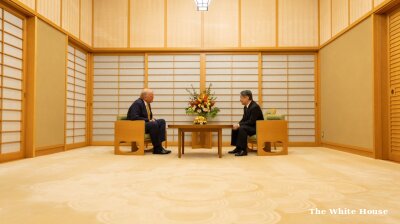
US-China trade talks deliver breakthrough as markets rally ahead of Trump-Xi meeting at APEC
How and if China will react to a US-Japan rare earths deal remains to be seen but Beijing has said it will suspend its restrictions on rare earth metal exports in what is a move likely to ease pressure on the US tech and defence sectors.
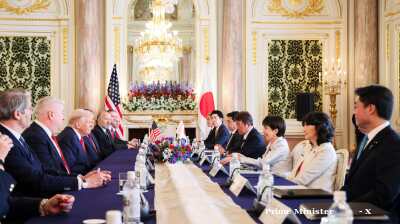
US, Japan sign rare earths deal to ‘secure’ supply chains
The two leaders signed an agreement establishing a framework for cooperation in the mining and processing of rare earths and other essential minerals; a move that underscores growing anxieties over China’s dominance in the sector.
.jpeg)
Mexico secures trade extension with US, averting November 1 tariff escalation
US President Donald Trump and Mexican President Claudia Sheinbaum have agreed to extend a critical trade deadline by several weeks, granting negotiators additional time to resolve 54 outstanding commercial barriers between the nations.
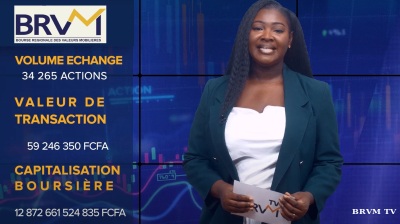
West Africa’s BRVM market cap hits record $21.2bn driven by telecoms, banks
West Africa’s regional bourse hit a record market capitalisation, up 29% YTD, supported by strong performance among telecom and banking stocks, and rising participation from domestic institutional investors.
